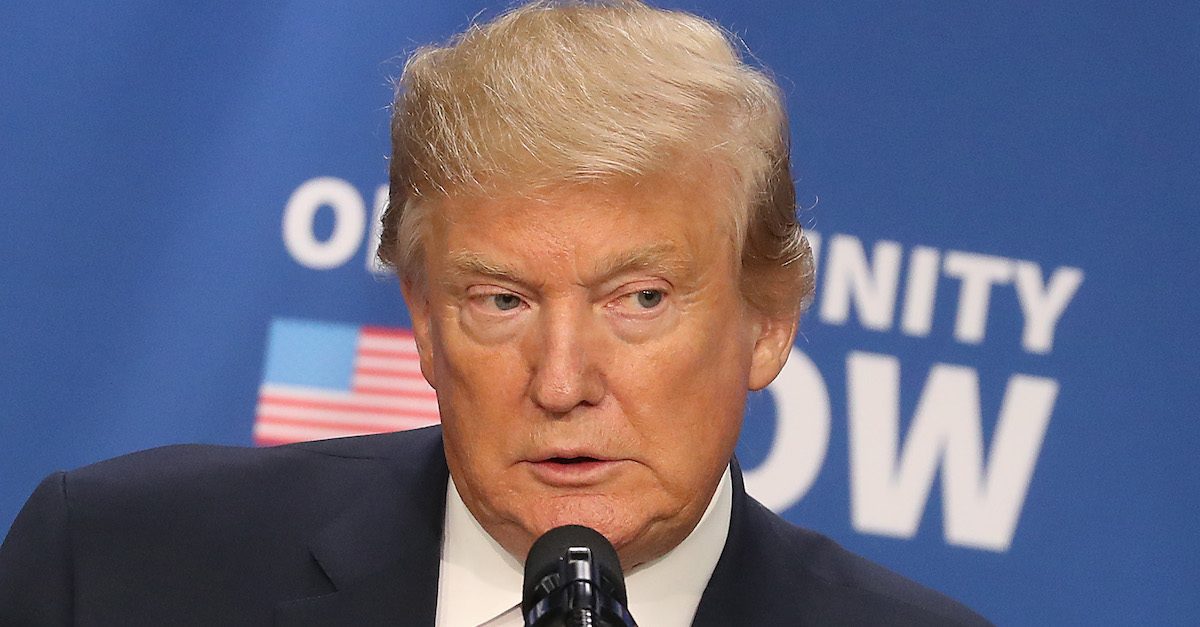
Lawyers for President Donald Trump on Thursday filed a motion the United States Court of Appeals for the Second Circuit seeking to reverse a lower court’s decision denying Trump’s request for a preliminary injunction to prevent Deutsche Bank from releasing financial records to the House Committee on Financial Services.
In an argument that has taken aback at least one legal scholar. Trump’s attorneys claim that the Constitution prohibits Congress from enacting any legislation that pertains to a sitting president’s finances. Former Deputy Assistant Attorney General and current professor at the Georgetown University Law Center Marty Lederman seemed particularly struck by the claim, calling it “radical” in a series of tweets Friday morning.
To give you a sense of just how radical Trump’s arguments are in the cases challenging congressional subpoenas, a brief he filed in the Deutsche Bank case in the CTA2 yesterday says that ‘a sitting President’s finances and the conduct of foreign companies, individuals, and governments [including its financial involvements [with] a sitting U.S. President are ‘area[s] in which Congress is [constitutionally] forbidden to legislate,’ and off-limits to congressional investigation. Seriously.
The president’s primary argument for not abiding by the subpoena for his financial records is that the congressional inquiry “lacks a legislative purpose,” and a congressional subpoena may not be used if the primary purpose of the information sought is “to prove wrongdoing and to explore and expose the Plaintiff’s private information.”
However, Trump’s attorneys already tried this tactic to no avail in a similar case earlier this year when Judge Amit Mehta of the D.C. District Court ruled that the president’s finances were absolutely within the scope of Congress’ investigative authority and that Congress’ motives under such circumstances can’t be questioned by the court.
“[C]ourts may not ‘test the motives of committee members’ to negate an otherwise facially valid legislative purpose […] So long as Congress acts in pursuance of its constitutional power, the Judiciary lacks authority to intervene on the basis of the motives which spurred the exercise of that power,” Mehta wrote. “Thus, it is not the court’s role to decipher whether Congress’s true purpose in pursuing an investigation is to aid legislation or something more sinister such as exacting political retribution.”
“If there is some discernable legislative purpose, courts shall not impede Congress’s investigative actions,” he added.
To combat this widely accepted principle of American governance, Trump’s attorneys introduced a new argument Thursday which essentially claims that there can be no legitimate legislative purpose for Congress’s subpoena because Congress is constitutionally prohibited from from enacting legislation related to the president’s finances.
“Any such legislation would have to be pertinent, within the Committees’ legislative jurisdiction, and constitutional. Yet the Committees do not dispute that a sitting President’s finances and the conduct of foreign companies, individuals, and governments are ‘areas in which Congress is constitutionally foreseen to legislate,” Trump’s attorneys wrote. “Here, the committees are not pursuing legislation that is pertinent, valid, and within their jurisdiction.”
This claim, if accepted, would have a significant impact on the ability of Congress to check the power of the president.
[image via Mark Wilson/Getty Images]
Have a tip we should know? [email protected]